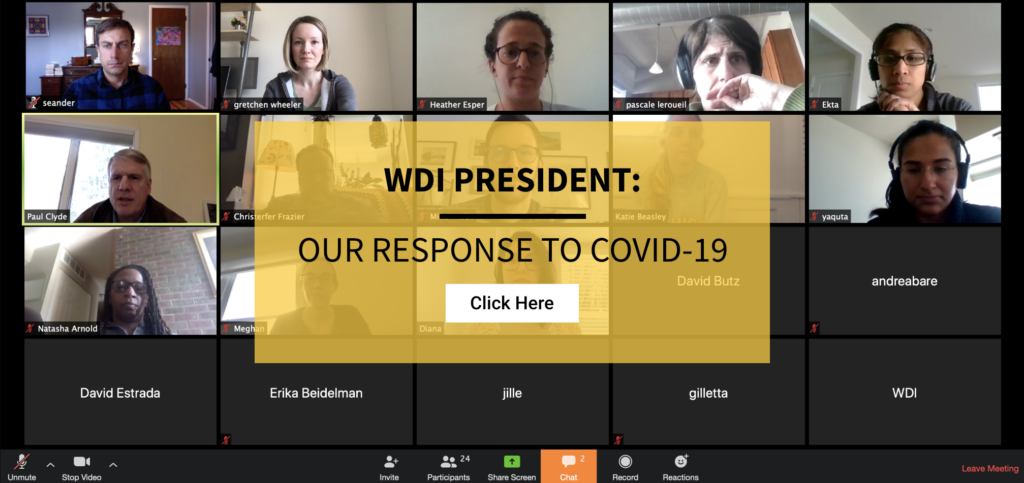
Above: A group of WDI staff during a video call earlier this week.
Dear readers:
Businesses, nonprofits and educational institutions are working swiftly to adapt to the global challenge presented by COVID-19. The William Davidson Institute at the University of Michigan is no exception. We have taken the appropriate actions to ensure the health and safety of our employees and others, including the closure of our on-campus offices.
That said, WDI remains 100% committed to serving our business, nonprofit and academic clients and partners, as well as supporting our student programs and affiliated faculty. Indeed, we are looking forward to launching new projects and actively exploring future opportunities with a wide range of partners.
In my discussions with clients and partners, both in the U.S. and around the world, as well as student teams and my colleagues here at WDI, I have been truly impressed with their perseverance and determination to remain focused on their important work.
In this month’s newsletter, I’m proud to showcase some recent achievements of our staff, clients, partners and students. In the coming weeks, the methods we use (e.g. video meetings and telecommuting) to complete work may look slightly different. But what hasn’t changed is our steadfast commitment to WDI’s mission, and to our clients and partners.
-Paul Clyde, WDI President
This primer provides a comprehensive but non-technical overview of the distinct health information systems (HIS) that all together support health care delivery in low-resource settings. It opens with a historical account and landscape assessment and describes the urgent need to build a lean rigorous HIS that integrates these different components. Subsequent sections describe the individual systems that: i) track individual patient and health care provider information; ii) directly document care delivery; iii) provide public and population health data; iv) support facilities’ and community health workers’ administrative and financial functions; and v) coordinate logistics and health commodities supply chains. A separate section describes imported data, including “master data” and manufactured (e.g., “meta”) data. The primer closes with recommendations for principled HIS stewardship.
WDI is a collaborative, multi-disciplinary organization. As a result, it often engages multiple sector and services teams in our work. The following project undertaken by both our Education sector and Performance Measurement and Improvement service demonstrates our holistic approach. The Education sector implemented Business & Culture: A Virtual Practicum — a classroom-to-classroom, action-learning course on international business cultures that brings together undergraduate students from Egypt, Libya and the U.S., supported by the Stevens Initiative. The course ran five times at the Ross School of Business, starting in Winter 2020. Participants attended lectures by international faculty, worked on interregional teams through synchronous and asynchronous exchange, employed field research methods to learn about one another’s business cultures and created a final project that captured their cross-cultural learnings. The program equipped young people in the U.S. and MENA region with the necessary competencies to communicate, problem-solve and collaborate in a global team environment—all essential 21st century skills in an interconnected world. The Education sector collaborated with the Performance Measurement and Improvement service, which led the design and implementation of an impact evaluation of the program on students in the U.S., Libya, Lebanon and Egypt. In addition to assessing the impact of the program on student outcomes (e.g. empathy, cross-cultural communication skills, business skills and knowledge), the data was used to improve the course and develop generalizable knowledge on how to increase the impact of virtual exchange courses.
WDI has produced a new video that highlights its work on the successful M²GATE program that connected more than 400 students from five Michigan college campuses and their peers in four Middle East and North Africa (MENA) countries through virtual exchange.
The video, titled “WDI’s M²GATE Program: Virtual Learning, Real World Impact,” features interviews with students from Michigan, Libya and Morocco, a mentor from Libya and scenes of student team planning sessions in Michigan, Libya and Tunisia. There also is footage from the final pitch competition that came at the end of the program.
M²GATE, short for MENA-Michigan Initiative for Global Action Through Entrepreneurship, used virtual exchange to bring together the Michigan students with those in Egypt, Libya, Morocco and Tunisia. Teams worked virtually to develop social entrepreneurship projects and accompanying pitches over an eight-week period with the help of instructors, mentors and successful entrepreneurs from MENA and Michigan.
At the end of each of the three cohorts, the program hosted a virtual competition with judges naming winners based on each team’s video that pitched their scalable solution. The winning team from each cohort then traveled to Ann Arbor to participate in a live pitch competition at the University of Michigan.
The program increased cross-cultural understanding and equipped young people with the skills needed to thrive in a 21st century economy, such as entrepreneurship, team building, innovation and design thinking, international business, problem solving and critical thinking. (Read more about the program’s impact here.)
Designed and managed by the Institute throughout 2017-2019, M²GATE was funded by the Stevens Initiative, an international effort to build global competence and career readiness skills for young people in the United States, the Middle East and North Africa. The Stevens Initiative is sponsored by the U.S. Department of State and administered by the Aspen Institute. The Stevens Initiative is also supported by the Bezos Family Foundation and the governments of Morocco and the United Arab Emirates.

Sally Stephens, the Feb. 12 WDI Global Impact Speaker and chief business officer of Medicines360, the only nonprofit pharmaceutical company with a marketed product in the U.S., sat down for a one-on-one interview while on campus. (Watch the interview below.)
Stephens was interviewed by Andrea Bare, senior advisor with WDI’s Healthcare focus area, who talked with Stephens about a number of the organization’s operations. Stephens detailed Medicines360’s origin, its business model and how it operates, its approach to partnerships, how the U.S. market compares to sub-Saharan Africa and what the future holds.
Regarding partnerships, Stephens told Bare that Medicines360’s approach is to “partner if someone has the expertise that will help us meet our mission,” she said. “We saw a lack of expertise in the U.S. public sector, so we developed that expertise.”
She said the same “myths and gaps” exist in both the U.S. and sub-Saharan Africa markets. For the future, Stephens said, Medicines360 will “focus on broadening our impact.”
“It is all about access for us,” she said.
Medicines360 has a unique mission-driven business model and an innovative partnership with Allergan. As its name implies, Medicines360 has a global focus and is driven to meet an unmet need for women around the world, including in the U.S. That is, affordable, long-acting contraceptives.
Its first product is a hormonal intrauterine device, or IUD, which had been out of reach for many women because of the high cost of the sole brand on the market. Medicines360 offers its FDA-approved Liletta at a discounted price to public sector clinics across the U.S. to increase access to this important family-planning product.
Additionally, Medicines360 has been working with international health organizations to offer the product, branded as Avibela in low- and middle-income countries, to also increase access to these markets. Avibela was launched in Madagascar in 2018. Sales of Liletta in the U.S. help fund research and development efforts by the company to bring contraceptives to countries such as Madagascar.
Stephens, who joined Medicines360 in 2011, leads the corporate strategy, business development, marketing and sales, and the developing countries programs at the organization.
WDI Education, along with two business school professor colleagues from the Philippines, recently visited several Detroit entrepreneurship- support organizations. Given our interest in supporting entrepreneurs in emerging markets, we were especially interested to learn from the entrepreneurs we met in Detroit. Here are some key takeaways.
Ted London, vice president and senior research fellow of WDI’s Scaling Impact Initiative, has dedicated his career to exploring the role of business in alleviating poverty, particularly with respect to the base of the pyramid (BoP), defined as the 4-5 billion people who live on less than $3,000 per year. A key focus of his work is sharing what he has learned with aspiring entrepreneurs and future venture leaders through his MBA course, Business Strategies for the Base of the Pyramid, at the University of Michigan’s Ross School of Business.

In recognition of his impact, London has been named an Aspen Faculty Pioneer Award winner, given to innovative business professors teaching about the most pressing “grand challenges” faced by society today. London’s award also includes a “Building the Field” distinction that honors his long-term influence on building the BoP domain and shaping the next generation of business leaders.
Watch a video of London talking about his work here.
The awards, handed out by the Aspen Institute Business and Society Program, were established in 1999 to honor educators who exhibit leadership and risk-taking, and develop curriculum that studies the relationships between capital markets, firms and the public good. The Aspen Institute is an educational and policy study organization that provides a nonpartisan venue for dealing with critical issues.
“This year’s Faculty Pioneers are leading the charge toward a more modern version of business education,” said Claire Preisser, who manages the Faculty Pioneer selection process as associate director of the Aspen Institute Business and Society Program. “Against the backdrop of society’s ever-increasing expectation of firms, business education is still organized around preparing students to be profit maximizers – focusing them on financial, largely short-term measures of business success. Instead, our award winners equip students with the kind of problem-solving skills that firms need to make a positive impact on the most pressing issues of our time.”
London said he was humbled by the award and heartened to see his work in the BoP domain recognized.
“Our students seek to harness the power of enterprise to address society’s grand challenges, including poverty and inequity faced by the base of the pyramid,” London said. “Now more than ever, these students want strategies, frameworks and processes that guide and drive action. They also need to appreciate the unique opportunities and challenges of operating an enterprise in this demanding market environment.
“My goal is to provide them with both an action-oriented toolkit and the contextual knowledge needed to build scalable businesses with substantial social impact.”
His latest book, “The Base of the Pyramid Promise: Building Businesses with Impact and Scale,” was released earlier this year. WDI Publishing has also published many of his case studies.
In addition to London, Andrew J. Hoffman, Holcim (US) Professor of Sustainable Enterprise at Michigan Ross, was named a Faculty Pioneer Award winner. Hoffman and his graduate students have also authored many case studies found on the WDI Publishing website.
WDI Case Publishing recently exhibited at the prestigious Academy of Management (AOM) conference, the fourth time the case study publisher has had a booth at one of the biggest annual gatherings of students, academics, scholars and professionals interested in the academic study of management and organization practices.

This year’s AOM meeting, held in August in Anaheim, Calif., drew more than 10,000 registrants. WDI had previously attended AOM conferences in 2012, 2013 and 2014. WDI Case Publishing was a primary event sponsor in 2012.
“This event is advantageous for WDI because it gives us an opportunity to network with other publishing colleagues, and keep an eye on trends and gaps in the market,” said Sandy Draheim, manager of marketing and case publishing at WDI.
WDI’s booth in Anaheim featured WDI Publishing’s new branding and samples of its cases in each core business discipline, plus several in the social impact topic area. Faculty attendees from the U.S. as well as abroad were most interested in cases covering topics such as organizational behavior, strategy, and international business. Professors expressed interest in WDI Publishing’s unique collection of social impact case studies as well. There also were many, many requests for WDI Publishing’s case submission requirements.
“It was gratifying that nearly all visitors to our booth had heard of, and were aware of, WDI Publishing, and most had already visited our website or adopted at least one of our cases,” Draheim said. “I also displayed our new WDI brochure and received many inquiries about the Institute’s work.”